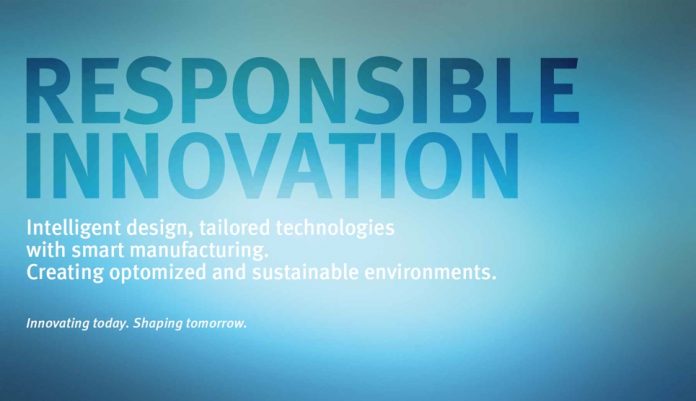De laatste maanden zien we steeds meer berichten over “Responsible Innovation” in de wetenschappelijke social media. Het thema is ontwikkeld uit Maatschappelijk Verantwoord Ondernemen als een onderwerp dat zich meer dan voorheen richt op het effect en de consequenties van innovatie op de lange termijn. Dit kunnen technologische effecten zijn, antropolighsche effecten en ethische effecten.
Het fundament van het onderzoek ligt in het Collingridge Dilemma:
The Collingridge dilemma is a methodological quandary in which efforts to control technology development face a double-bind problem: an information problem – impacts cannot be easily predicted until the technology is extensively developed and widely used – and a power problem – control or change is difficult when the technology has become entrenched.
De manier waarop bedrijven aan de slag kunnen gaan met Responsible Innovation is drievoudig:
1. Waardebewust ontwerpen en ontwikkelen: dit aspect beschrijft het het feit dat al in de ontwerpfase van innovatieprojecten rekening moet worden gehouden met de ‘why of innovation’. In andere woorden: biedt het idee een oplossing voor een van de ‘grand challenges’ waarmee we op de lange termijn te maken krijgen? Waarden staan centraal in deze discussie.
2. Ethisch parallelonderzoek: in elke stap van de innovation management funnel zouden ethische onderzoekers betrokken moeten worden en – als het kan – ook onderzoekers uit andere gebieden. Op deze manier kan de impact van innovatie op de lange termin beter worden voorspeld en kunnen ongewenste effecten beter worden voorkomen.
3. Constructive Technology Assessment: innovatieteams moeten niet langer monodisciplinair, maar multidisciplinair zijn. Niet geheel toevallig is dat natuurlijk ook één van de grondbeginselen van Open Innovation.
Als u geïnteresseerd bent in dit onderwerp, kunt u zich er verder in verdiepen via de volgende materie:
Responsible Innovation: Managing the Responsible Emergence of Science and Innovation in Society
Science and innovation have the power to transform our lives and the world we live in – for better or worse – in ways that often transcend borders and generations: from the innovation of complex financial products that played such an important role in the recent financial crisis to current proposals to intentionally engineer our Earth’s climate. The promise of science and innovation brings with it ethical dilemmas and impacts which are often uncertain and unpredictable: it is often only once these have emerged that we feel able to control them. How do we undertake science and innovation responsibly under such conditions, towards not only socially acceptable, but socially desirable goals and in a way that is democratic, equitable and sustainable? Responsible innovation challenges us all to think about our responsibilities for the future, as scientists, innovators and citizens, and to act upon these.
The Importance of Responsible-Innovation and the Necessity of ‘Innovation-Care’
This study deals with responsibility as part of innovation. By nature, innovation gives birth to development for the organization and can only be at the core of any strategy within an ever-increasingly global economic context. However it also raises new questions stemming mostly from the impossibility to forecast the success of the innovations. More precisely, the questions raised by innovation also concern its consequences on society as a whole. Today, the innovator should understand his responsibility, the consequence of each innovation.
Moreover, common acceptance of the word ‘responsibility’ raises some questions about its use and how it should be understood. What does ‘responsibility’ mean? Who is responsible and for what? Through the notion of ‘care’, we aim at providing an evolution of responsible-innovation. The concept of ‘innovation-care’ is centered on people and more precisely focuses on taking care of them. The purpose of innovation-care is indeed to innovate and keep up with the level of productivity necessary to any organization while taking into account the essential interdependence between the status of the innovator and that of the citizen.
Enhancing Socially Responsible Innovation in Industry
This thesis presents a study that aims to explore to what extent corporate researchers in the field of industrial Life Science & Technology (LST) can consider social and ethical aspects of LST innovation to improve their Research and Development (R&D) practices. Innovators, particularly those working in controversial scientific and technology fields such as industrial LST, are encouraged to adopt socially responsible innovation methods. This requires that researchers, who work in such fields, consider the broader social and ethical context of their R&D activities.
The presented study explores first how corporate researchers can integrate such aspects in their daily work and how this could improve their work. Second it investigates whether such integration leads to a quantitatively assessable improvement of the quality of R&D. The results indicate that integration is possible, and leads to a measurable improvement of the quality of R&D work. In addition, researchers see a number of improvements in their R&D work, e.g. in the quality of communication and cooperation, and how to link their own work to corporate strategies and marketing. This thesis can be useful for innovators who wish to enhance socially responsible innovation practices, as it presents a tool for R&D management that allows for the operationalisation of socially responsible innovation and improved R&D performance.
First annual conference Responsible Innovation

